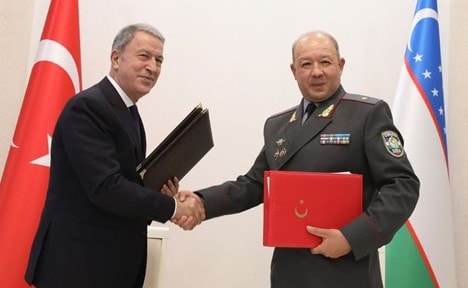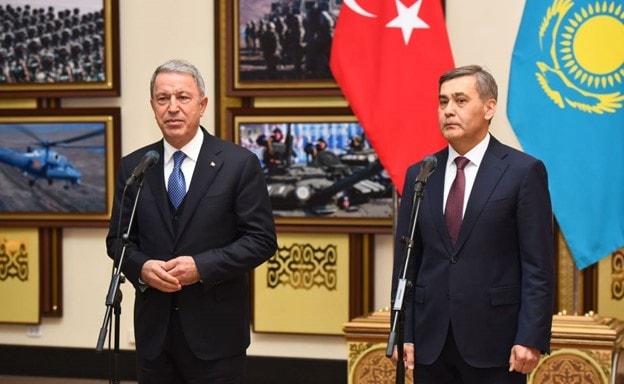Russia watched warily as Turkish Defense Minister Hulusi Akar visited Kazakhstan and Uzbekistan hoping to parlay Turkey's backing of Azerbaijan into closer military cooperation between Turkey and two Turkic countries. It aroused fears that an 'Army of Turan' was in the making. Gazeta.ru's Alexey Gryazev surveyed Russian experts over whether the developments posed a threat to Russia. While the experts saw no immediate danger, they noted that Turkey has made persistent efforts in welding the Turkic peoples together and is not about to desist from them. They expected the states targeted by Turkey to take from Ankara what was beneficial to them without sacrificing ties to other partners. However, if things went awry, the result could be tragic.
Gryazev's survey follows below:[1]
"A Productive Trip
"...The Turkish Defense Minister Hulusi Akar made a brief tour around the countries of Central Asia. As it was reported on October 28, one result of this trip was the signing in Tashkent of a military and military-technical cooperation agreement between Uzbekistan and Turkey.
''We are trying to strengthen relations in all spheres - trade, economic, social, political and, of course, military relations’ sphere. We have made significant progress.' - said Akar following talks with his Uzbek counterpart Bakhodir Kurbanov."

Akar and Kurbanov ( Source: Avim.org.tr)
"On the same day, Akar, according to [Turkey's] “Anadolu” agency sources, met with Viktor Makhmudov, Secretary of the National Security Council of Uzbekistan, as well as with President Shavkat Mirziyoyev. At these meetings, the parties discussed the state of their military cooperation, and also paid special attention to the issues of joint training of military personnel and to the establishment of networking among universities.
"The previous day, on Monday, Hulusi Akar had paid a visit to another Central Asian country - Kazakhstan.
"There, the Turkish defense minister pursued the same goal as in Uzbekistan: to strengthen bilateral cooperation in the military sphere and the defense industry.
"Following the talks with Nurlan Yermekbayev (Kazakhstan's Minister of Defense) the Turkish minister noted that the dialogue between the parties was 'quite easy'. 'As at the presidential level, very close dialogue and cooperation exists between the heads of our states.” – he explained.
"Yermekbayev, for his part, stressed that Turkey is a strategic partner of Kazakhstan, and recalled that an agreement on military cooperation between the two countries was signed back in 2018 by the first president of Kazakhstan, Nursultan Nazarbayev. This document was ratified under the new head of state - Kassym-Jomart Tokayev.
"The bilateral agreement between Turkey and Kazakhstan bears the same character as the agreement with Uzbekistan, signed the previous day. This format provides for the development of long-term military cooperation, interaction in military training, holding of [military] exercises, transit of military equipment through the airspace, providing of medical assistance, and the conduct of scientific and technical research.
"And although cooperation between Nur-Sultan and Ankara in the military sphere (in contrast to signed Turkish-Uzbek agreement) is not something new, Hulusi Akar’s visit to Kazakhstan attracted special attention in the Turkish and subsequently the Russian media.

Akar with Yermekbayev (Source: Ratel.kz)
"The Road To The 'Army Of Turan'"
"On October 27, the Turkish magazine “Turkiye Gazetesi” published an article titled “The Road to a Turanian Army”. The article cites the opinions of Turkish military experts and states, that Azerbaijan's successful offensive in Nagorno-Karabakh (using Turkish military equipment) brought the realization of Ankara's old dream closer [to reality].
"The article is about the creation of the 'Army of Turan' - a military bloc that unites the Turkic-speaking countries. Hulusi Akar's visit to Kazakhstan is regarded by the publication as one of the steps towards the creation of a unified army of the Turkic states.
"Potential candidates for membership are countries of the former USSR: Azerbaijan, Uzbekistan, Kazakhstan, Kyrgyzstan and Turkmenistan. And here it is important to note that Kazakhstan and Kyrgyzstan are members of the CSTO, which, in addition to Russia, includes Armenia, which is at war with Azerbaijan. Their synchronous participation in another military-political bloc led by Turkey will undoubtedly create additional points of tension in the post-Soviet space.
"However, experts interviewed by Gazeta.ru are skeptical about such a perspective and the possibility of creating an 'Army of Turan' in the foreseeable future.
"Yuri Mavashev, Director of the Center for the Study of a New Turkey, emphasized that the coverage of the 'Turan Army' idea by Turkiye Gazetesi is an insignificant fact, since this publication is considered on the fringe and has nothing in common with the pro-government Turkish media.
"This publication does not provide any reason to talk about any 'Turanian army'. Military-strategic cooperation is always the highest degree of integration that crowns political integration. The political base that is necessary for the creation of the 'Turanian army' simply does not exist. Even back in the 1990s, the basis for this was more robust than it is now.
"Therefore, Turkey still has a lot of preparatory work to do before it can talk about this military-technical cooperation. So far, this is just a wishful thinking." - said the specialist.
"The expert drew an analogy with the EU, most of whose members are also NATO members. [However] years and even decades of multilateral political and economic integration preceded this level of consolidation. However, in the case of a potential alliance between Turkey and the countries of Central Asia, nothing of the kind is evident, stated Mavashev.
"Viktor Nadein-Raevsky, a senior researcher at IMEMO [The Institute of World Economy and International Relations] of the Russian Academy of Sciences, shares his point of view. However, he notes, that Ankara is indeed pursuing an active policy of promoting the Pan-Turkism ideas.

Viktor Nadein Raevsky (Source: Valdaiclub.com)
"Pan-Turkism Without Borders
"According to the expert, the idea of Pan-Turkism is extremely popular in Turkey. Its main political supporter is the Nationalist Movement Party, allied to President Recep Erdogan.
"'Erdogan plays on their propaganda, their agitation, their supporters and on the organization of these supporters, because his own electoral base is not so large. Without them, he would not have majority, so he plays this game. In other words, the interest here is not only foreign, but also a domestic one.' - the expert says.
"The main instrument to achieve this goal is the Turkic Council, created in 2009, which united all (with the exception of Turkmenistan) modern representatives of the Turkic world.
"'Until today, we said "One nation - two states." Yesterday I stated that now we have become one nation [within] five states. With God’s help, Turkmenistan will also join us, and thus we will become one nation [within] six states. We will strengthen joint cooperation in the region.' - said Erdogan after the council's regular meeting in October 2019.
"Ankara began to pursue this policy back in the early 1990s. For example, Turkey was the first country to recognize the independence of the new states of Central Asia. In those years, Turkish politicians enthusiastically discussed the possibilities for 'the restoration of Turkic unity', and new terms appeared in the media: 'Uzbek Turks', 'Kyrgyz Turks', 'Tatar Turks' or simply – 'Foreign Turks'.
"Educational programs were actively created for such 'Foreign Turks', where young people from Central Asia and Azerbaijan were told about the advantages of the Turkish way of development. Over the past 20 years, the Turks have provided 26 thousand scholarships for Turkic-speaking students both in Turkey itself and in local branches [of these Universities]. In addition, Turkish satellite channels operate in all the Turkic-speaking republics in the post-Soviet space.
"In the early 90s, ex-Prime Minister of Turkey Suleiman Demirel said that his country had a unique prospect 'to determine the political future of the Muslim republics of the CIS.' In order to achieve this goal, the Turkish Foreign Ministry even created the Agency for Turkic Cooperation and Development (TIKA), whose goal was to develop relations with the Turkic-speaking countries of the former USSR.
"At the same time, as the Turkologist Nadein-Raevsky notes, the idea of creating the so-called “Great Turan” is not limited to the post-Soviet countries.
"Ankara’s sphere of interests also includes the Xinjiang Uygur Autonomous Region of China, a part of the territory of Afghanistan inhabited by Uzbeks, as well as the regions of Russia inhabited by the Turkic-speaking peoples.
"'28 Turkic peoples live on the territory of our country. Far from all of them are Muslims, for example Yakuts, Tuvans, indigenous peoples in the north of Russia. Therefore, this is an extremely dangerous story for our country.' - emphasizes the expert."
"Does Turkic Unity Exist?
"There is no reason to talk about unconditional support for Ankara's foreign policy ambitions by the Turkic-speaking countries and peoples. Andrei Kazantsev, professor at the Faculty of World Economy and World Politics at the Higher School of Economics, notes that although the ideas of Pan-Turkism are popular in the countries of Central Asia, they are perceived only as one of the possible development directions.
"'All the countries of Central Asia, and especially Kazakhstan, are pursuing a so-called "multi-directional foreign policy". Under it, Kazakhstan is trying to develop cooperation with Russia, China, the United States, the European Union and Turkey.
"'The Turkish course is probably [only] a fifth direction of Kazakhstani foreign policy. To say that it is dominant one is a gross exaggeration.
"'Turkey would like to be [the main policy direction] and what it has been trying to achieve it since the nineties. But it is quite removed from the reality of what is happening in Central Asia.' - emphasized the specialist.

Andrei Kazantsev (Source: Vestnikkavkaza.net)
"For his part, Viktor Nadein-Raevsky notes, that in Central Asia Pan-Turkism is rather a marginal idea, that the majority of the population does not support. Also, the implementation of the idea is hampered by the numerous non-Turkic minorities living in the countries of the region.
"'The path towards Pan-Turkism is always the military one, it is the way of ousting other peoples and nationalities. This is a primitive, but very difficult idea to implement. Of course it is impossible to create this "Great Turan”. But in attempts to create it, a lot of blood will be shed.' - said the expert.
"Andrei Kazantsev explains the development of cooperation between the Central Asian states with Turkey by their desire to get the maximum benefit from all external partners.
"Kazakhstan and other countries simply do not see the point in denying any form of partnership that Turkey offers.
"'This does not mean that Nur-Sultan will abandon other [policy] directions: cooperation with Russia, China, the European Union and the United States. It will establish these directions before the Turkish one.' - emphasizes Kazantsev.
"This approach is evident in statements by representatives of the Kazakhstani elite. Amirzhan Kosanov, an opposition politician and ex-presidential candidate of Kazakhstan, in a conversation with “Gazeta.Ru”, urged that evaluating Kazakh-Turkish cooperation via the logic 'whoever isn't with us - is against us', be avoided.
"'Kazakhstan and Russia, as neighbors and strategic partners, are "doomed" to live together. That says it all. Moreover, we have mutual obligations within the EAEU and the CSTO, - says the politician. - At the same time, no one denies the Turkic brotherhood and cooperation, just as no one denies the same Slavic brotherhood. Kazakhs have many relatives around the world, Turkey is one of them.'"
[1] Gazeta.ru, October 28, 2020.





